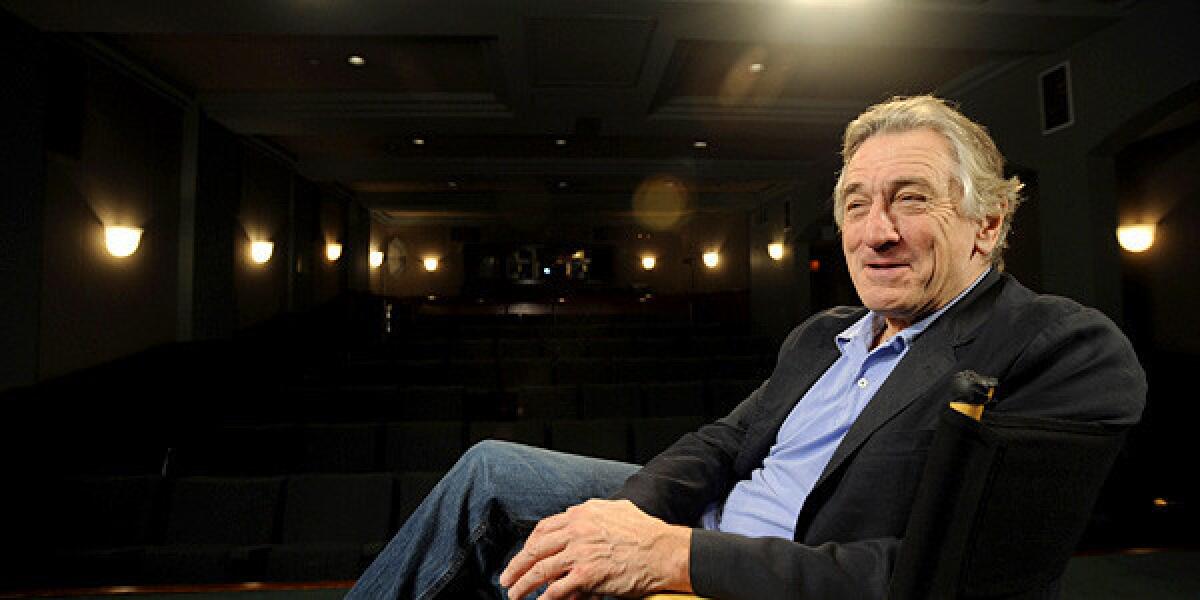Funny or serious, Robert De Niro always a sharp blade

NEW YORK — — For anyone with a working knowledge of Robert De Niro’s career, the sight of an ax nailed to the side of a bookcase in his office can be a little disconcerting.
“It’s from a movie I made once,” he says by way of explanation.
Good to know, though it doesn’t look like a prop. Which one?
“‘Backdraft.’”
Whew.
OSCAR WATCH: ‘Silver Linings Playbook’
For nearly 50 years, Robert De Niro has built an acting career with a firm grounding in his ability to convey menace. When he lets his face go slack and eyes fall blank in a role, it’s as if a nictitating membrane has risen to protect a shark’s gaze before the attack — and bad things tend to ensue in the coming scenes. Not necessarily with an ax, but still. Those types of roles have won him two Oscars, for “The Godfather: Part II” and “Raging Bull,” and garnered him most of his five other nominations. A quiet, interior man in person, De Niro can, when he likes, effectively scare the pants off audiences.
Arguably, his nomination for “Silver Linings Playbook” is the outlier: It’s the closest he’s come to Oscar recognition for his comedic talents, even if the film is best classed as a quirky dramedy, with some explosive scenes. De Niro’s Pat Sr. has an obsessive fixation on (and an unfortunate gambling interest in) the Philadelphia Eagles, and his son’s (Bradley Cooper) own mental issues upset his world. It may not be a laugh riot, but it is comedy, De Niro style.
Yet the actor does not think of himself as a funny guy. “I know practically no jokes,” he says. “I like jokes. I feel like I have a good sense of humor — but I don’t like to get too serious about certain things.”
“Silver Linings Playbook,” he says, “is not a comedic performance, really. The situations are funny, but they’re funny because these particular characters in the family have a dynamic that’s lively and funny — but real and serious. I wouldn’t say it’s funny, per se. That’s up for you to decide.”
He’s long since proved that he can carry light (“Midnight Run,” “Meet the Parents”) as well as dark, even if the nominations don’t reflect it. Part of that may be that he takes a serious, meticulous approach to roles of all genres, and he’ll debate the merits over the inflection of a single word if necessary. That’s what happened during “Silver Linings,” as he explains, referring to a challenging scene he filmed with director David O. Russell. “When Bradley’s character comes home [unexpectedly from a mental facility] and I go, ‘What?’ — he wanted me to do it big. I said, ‘It’s too big. It feels like you’re trying to reach for something.’”
OSCARS 2013: Nominee list | Reactions | Trivia | Ballot | Snubs & surprises | Quiz
But as a pro, and also as an actor who has directed (1993’s “A Bronx Tale” and 2006’s “The Good Shepherd”), he understood the importance of trying to give Russell what he wanted. “He had something in his mind, and I understand that as a director sometimes you have something in mind — and you have to sometimes let that original concept go, and go with what the actor is capable of giving you.
“There’s always a way to get there, not necessarily the way you conceived it originally. What the actor arrives at can be as good or better than what you were thinking, but, all in all, you have to let the actor arrive at it in their own way.”
That ability to shift and understand both the director’s and actor’s needs is something he’s learned to do over the years. And as he prepares to turn 70 this year, De Niro says he still feels “pretty agile,” adding, “I don’t feel like I’m the age that I am. My energy is probably as good as it was when I was younger, but … you have to know what you’re doing.”
Clearly, De Niro does. And even if at nearly 70 he wins his third Oscar for a not-so-comedic role in a sort-of comedy, don’t expect that he’ll give up the menacing game any time soon. (For one thing, he recognizes that part of his ability to be funny emerges from the audience’s expectations of his on-camera persona.) He’s already got another gangster film in the works, with Martin Scorsese at the helm: “The Irishman.”
Nothing wrong with a little repetition, says the man who keeps an ax at his front door. “I shouldn’t say this,” he admits, “but Marty and I do [gangster films] pretty well. We understand it, the character. And if you do something well, do it again. Artists will do certain themes over and over again. If you’re not doing it well, what’s the point?”
More to Read
Only good movies
Get the Indie Focus newsletter, Mark Olsen's weekly guide to the world of cinema.
You may occasionally receive promotional content from the Los Angeles Times.










